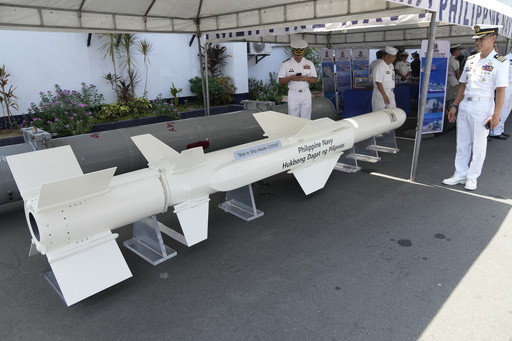MANILA, Philippines (AP) — The Philippines will continue to build security alliances and stage joint combat drills in disputed waters to defend its territorial interests, Defense Secretary Gilberto Teodoro said Friday, dismissing China’s criticisms of such moves as paranoia.
Teodoro bluntly criticized Beijing’s increasingly aggressive actions in the South China Sea, without citing China by name, in a speech before the military’s top brass at a ceremony marking the anniversary of the Philippine navy’s founding in Manila. The Philippines, he said, would not tolerate aggression and provocative moves.
Since territorial hostilities with China surged last year in the South China Sea, Philippine President Ferdinand Marcos Jr.’s administration has taken steps to forge new security alliances with a number of Asian and Western countries and allowed a U.S. military presence in more Philippine bases under a 2014 defense pact.
In April and May, the Philippine military staged annual live-fire combat exercises with U.S. forces in and near the disputed waters.
China has said such actions by the U.S. and its allies, including the Philippines, were provocative, aimed to contain Beijing and were endangering regional security.
“Terming these cooperative activities with like-minded nations as a containment or a provocation is disinformation and evidence of paranoia of a closed political system,” Teodoro said in a clear reference to China. “The ultimate intent is to get what they want by the threat or the use of force. This we cannot allow to continue.”
The Philippines is the U.S.’s oldest treaty ally in Asia. Washington has warned that it is obligated to help defend the Philippines if its forces, aircraft and ships come under an armed attack, including in the disputed South China Sea.
The Philippines has defense pacts allowing American and Australian forces to enter the country for annual combat-readiness and disaster-response training and is negotiating a similar agreement with Japan and considering another pact with France. It has held joint maneuvers with the U.S., Australian and Japanese navies this year.
In their largest and boldest annual military exercises last month, thousands of U.S. and Philippine forces staged the retaking of an island and sank a warship in combat drills focusing on territorial defense in or near the South China Sea. They carried out aerial reconnaissance and logistical transport drills and secured an airfield during mock combat in a Philippine town near Taiwan.
“For the first time we have evolved a realistic training scenario with evolutionary hypothetical scenarios where we can actually test our capabilities,” Teodoro said. “There will be more maritime cooperative activity between us and like-minded nations.”
Chinese Defense spokesperson Wu Qian said in Beijing last month that “we oppose external interference, muscle-flexing, provocations and harassment in the South China Sea and oppose piecing together exclusive circles or bloc confrontation.” He said China would resolutely defend its territories.
Philippine actions to defend its internationally recognized exclusive economic zone “can, in no way, be termed by any sane person as a provocation,” Teodoro said, adding that Philippine officials were sworn to do that as their constitutional duty.
In addition to China and the Philippines, Vietnam, Malaysia, Brunei and Taiwan are also involved in territorial disputes in the South China Sea, a key global trade route.
Marcos has ordered his military to shift its focus to external defense from decades of domestic anti-insurgency operations as China’s actions in the South China Sea become a top concern. That shift dovetails with efforts by U.S. President Joe Biden and his administration to reinforce an arc of alliances in the Indo-Pacific region to counter China’s actions.
___
Associated Press journalists Joeal Calupitan and Aaron Favila contributed to this report.


